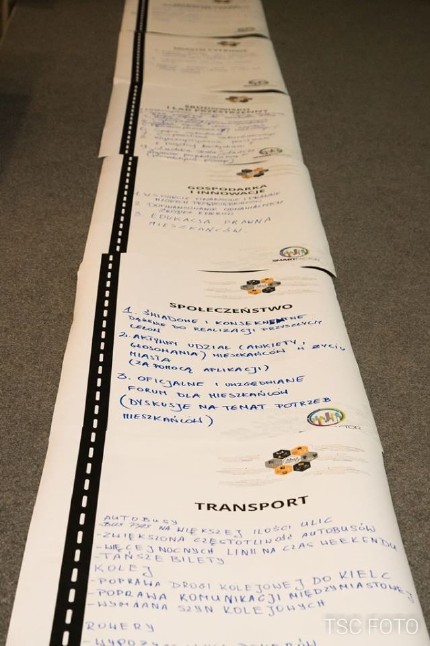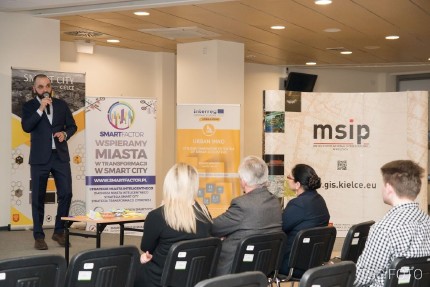Kielce Pilot: Collecting ideas for 2030+
The city of Kielce has been implementing the idea of Smart City, a sustainable intelligent city, for several years, but it is the beginning of a road that must be delineated based on a long-term vision worked out together with residents, a shared dream of our city in the future, however, clashes with the possibilities and objective conditions for find long-term solutions and use the opportunities of modern technologies.
The city of Kielce has started to develop a diagnosis and vision of the future of Kielce as an intelligent city for the needs of Framework Strategy Kielce Smart City 2030+. The strategy is developed for the following areas:
- Society
- Environment and spatial order
- Economy and innovation
- Infrastructure: transport
- Municipal infrastructure and energy
- Digital Kielce
Results of works on the Framework Strategy Kielce Smart City +2030 were presentenced to the citizens on the 5th of April 2018 at Kielce University of Technology:
- REPORT ON SOCIOLOGICAL STUDIES. The report presents sociological research carried out by direct interview on a random sample of 600 adult residents of the city of Kielce. Interviews referred to the sustainable development and the Smart City concept, taking into account 17 thematic areas listed in ISO 37 120 ‘Sustainable social development - Indicators for urban services and quality of life’.
- SUSTAINABLE DEVELOPMENT REPORT. The Sustainable Development Report presents the social, economic and environmental situation of the city of Kielce, based on objective data and indicators, including defined in ISO37120 ‘Sustainable social development - Indicators of urban services and quality of life’ developed by World Council on City Data.
- URBAN INNO project in the context of building a sustainable smart city, launching a common platform for smart city solutions in framework of URBAN and INNOVATION Working Group (Kielce Cluster). Presentation of proposal for pilot, SAM-artificial intelligence.
Citizens, who were at the workshops, had the opportunity to listen about city propositions for smart city. Kielce is planning further development in the spirit of the idea of Smart City, an intelligent city in which life is easier, more pleasant and healthier. To ensure and maintain a high quality of life in the city, natural resources should be protected and prudently managed, looking for both social and technological innovations in the functioning of the urban organism. Smart City Kielce means focusing on the needs of people, recognizing the interconnectedness of people and the environment, listening to each other and acting together in response to the needs of today, tomorrow and future generations. In an intelligent city, citizens work together for a better, healthier life, using new opportunities to save energy at home and work, getting it from sources other than fossil fuels, using environmentally friendly devices and means of transport, and limiting water, soil and air pollution. Intelligent solutions therefore require knowledge and education as a foundation for well-being. The smart city is to maintain a permanently high quality of life, protecting climate and nature, remaining an open city, conducive to cooperation and integration.
Participants were divided into six groups, working together on citizens proposals for the smart city. These working groups were aligned with areas developed within Framework Strategy Kielce Smart City 2030+.
Workshop Conclusions
Deficiencies and problems
- No time for residents to visit the office
- No trusted profile
- No online payment options
- Insufficient IT competence of the office
- Insufficient skills in the digital knowledge of Kielce customers and the lack of awareness that the city offers digital services
- Lack of common information for residents about e0-services, training, and events in the city
- No data system integration
- Not all information published by the office and other institutions are written in a language that residents can understand
- Insufficient number of trainings and workshops for office employees from operating, updated and implemented IT solutions
- Lack of internal communication in the Office
- Insufficient sharing of knowledge by all the city's organizational units
- Lack of integration of central systems implemented by administrations
- No electronic document flow
- Lack of communication between residents and the administration.
Strengths
- Operating IT systems
- Portal idea.kielce.eu
- Passenger information system
- Waste management system
- Urban spatial information system
- Urban fiber-optic network
- Organizational structure - functioning of the Department of Management Systems and Information Services and the Office of Intelligent Management of Sustainable Development.
Opportunities and key needs
- One access point for e-services and information about the city
- Individual resident profiles through which personalized e-services will be available
- Ensuring the integration of systems and e-services
- Creating an internal e-newsletter containing information on new deployments and applications of IT systems
- City Contact Center
- Creation of a knowledge base on administrative procedures, ways to carry out matters (including knowledge and problems that have to be solved) for the needs of providing comprehensive information to clients of the office and institutions by the City Contact Center.
More information about the event:
Warsztaty dla mieszkańców Strategia Smart City Kielce 2030+ Facebook event
Kielce TV: Inteligentne miasto nad Silnicą. Debata z mieszkańcami

Collection of Citizens' Ideas on Smart City areas

URBAN INNO @ Kielce Participatory Workshop
